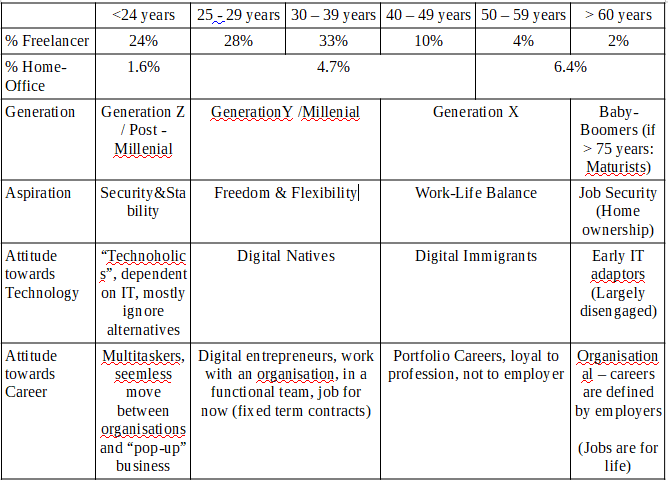Freedom as a Freelancer or Happiness in the Homeoffice?
- dorotheeberg
- Feb 12, 2020
- 4 min read
Updated: Feb 13, 2020
Is the workplace of the 21st century outside the designated corporate office space?
As a freelancer or when doing homeoffice, my workplace comes to me (as an answer to my second blog), but that can’t be the only reason of this nearly exponential growth of people “working from home”.
The statistics are interesting: in the 27 EU member countries the number of freelancers grew from 6.2million 2004 to 8.9 million in 2013, though an increase of 44.6% (freelancerworldwide.com).
Following another source (ec.europa.eu), in 2016 there were 30.6 million self-employed persons in the European Union. In case that both sources of information used the same initial database, that would signify an increase of 244% between 2013 and 2016!
On the homeoffice side , statistics say that in the European Union an average of 5% of the employees had the opportunity to “usually” work from home, in 2017 (ec.europa.eu).
Homeoffice was introduced in the European countries for different reasons:
- Germany: supporting family policy
- UK (pre-Brexit at least): supporting innovation and making working time more flexible
- Belgium: increasing business productivity, improving the quality of working life for employees and combating burn-out. (teletravailler.fr)
It has been thought as a step towards the overall wellbeing of the employees.
But is homeoffice applicable to all professional activities? How to apply home-office to a person whose job description requires continuous presence at the workplace?
What happens if an employee having a job requiring the presence at the workplace claims his or her “right” to telework?
And how about the future jobs of the 21st century and further?
Coming back to the freelance side. Freelancing is the same as an independent professional.
Who goes freelance and why? Will this be the mode of working in the 21st century?
Crossing statistics might bring further understanding, namely one showing the breakdown of ages of the first-time freelancers (websiteplanet.com), plus the one showing the breakdown of ages of teleworkers (ec.europa.eu), with some job related characteristics of the table “An overview of the working generations” published by Barclays in September 2013 in the brochure “A summary of talking about my Generation: Exploring the Benefits Engagement Challenge”:
From this crossed table we can read what we suspected: The younger we are, the more we are motivated to act as a freelance, and growing older we quite appreciate the homeoffice.
These preferences are absolutely influenced by the political, economical and digital environment that contributes to our understanding of the professional world, our values and culture.
Why choose people to go freelance? What are the difficulties they encounter?
The advantages for freelancers versus the employee status are flexible working hours, variety in work, being your own superior and being able to work everywhere.
The questions freelancers worry about most, concern the cashflow in terms of generating sufficient revenue to live on, to save for retirement and to pay taxes and social security, and though the finding of clients,
What are the advantages for companies to engage freelancers?
- Freelancers are flexible and skilled workers, they can be engaged for fixed term or recurring appointments.
- The following sounds really cruel but realistic : in case of an economical crisis, the company can get rid much more quickly of freelancers than of employees.
- Freelancers are cheaper than employees, as they invoice their daily or hourly rate, do not need a proper office (at least not paid by the company), they might be assigned a table and chair they can use, they have no other social or other advantage from the company, and they are only paid for the hours/days they effectively work.
What are the advantages of home-office for the employee?
- The employee has the security of his/her job with all the social advantages, he /she does not need to find clients (only if this is his or her job).
- Through the home-office, the employee can work in an undisturbed environment, from home, to do conference calls, write reports, develop software or do other things where he/she needs his/her full concentration.
- Through remote access to the office utilities, he/she is not completely cut away, but only physically absent.
The inconvenient of too many days of home-office per week, is that the employee loses the contact to his/her office network, as he/she is not quickly disturbed by colleagues to obtain perhaps essential information in an informal way.
The company, in according homeoffice to its employees, has the advantage that the people become more motivated in the office, and moreover, the company can save some rental fees on office space !
Considering that X% of the employees are on holidays, Y% have a sick day, Z% are working from home and W% are travelling for work, means that on average e.g. 25% of the office places , x square meters are not used, but paid for. The solution, that is applied by many companies, is to propose 75% working stations for 100% employees and no employee has a designated working station.
For completeness in this context, I should also mention the slasher, which is someone who accumulates several jobs (freelance or as a part-time employee) in parallel either by passion or by necessity.
If the increase of freelancers continues, does it mean, that at the end of the 21st century every “worker” will be a freelancer and the status of an employee will be a rarety? Is the working world slowly returning to the state of the times before the first industrial revolution?
Berg Global Consulting can assist you defining your needs for freelancers, introducing home-office or even part-time jobs for slashers!
Is it freelancing or home-office that procures freedom and happiness?






Comments